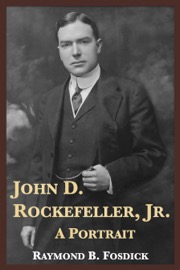 $9.99 on Kindle
$9.99 on KindleJohn D. Rockefeller, Jr.: A Portrait by Raymond B. Fosdick (188,000 words, 40 illustrations)
“Mr. Fosdick has written a biography in its formal meaning — fully documented, chronologically precise — and not simply a personal tribute to a friend of more than forty years’ standing. The book, in consequence, is both biography and history, satisfying all the rigorous canons of personal and social analysis. It is to be read as part of the history of our time and as the record of a man of as much consequence to us as have been those other leaders and creators among his contemporaries who have affected public conduct.
What we have here, then, is the narrative of a rich man who overcame the almost impossible handicaps of great wealth, limited religious upbringing, and a narrow and protective family circle. He might have become defensive and suspicious, or a recluse cultivating private and expensive hobbies, or a popular leader and therefore a demagogue (such patterns of the behavior of men of inherited fortunes are familiar throughout history), but instead he was able to grow and to assume great, national obligations.
What might have been a puzzle slowly disappears under Mr. Fosdick’s skillful scholarship and his deep regard for his friend. The young Rockefeller (he is called throughout the book ‘JDR Jr.’), as early as 1910, when he was 36, severed his direct connections with business: did he do so because of a real or unconscious rejection of his father? Quite the contrary; father and son early forged strong bonds of mutual affection and respect, but while there never was hostility on the part of the son, neither was there subservience.
JDR Jr. continued to support the philanthropies founded by the older man, the Rockefeller Institute for Medical Research, the General Education Board, and the Rockefeller Foundation, and to expand them; did he do this because he, like other men in public life — like Theodore Roosevelt, Woodrow Wilson, Louis D. Brandeis — was inevitably swept up in the ‘reform movement’ of the day? That was only a part, and possibly a minor one, of his development. For as his tastes became surer and his vocation clearer, he ranged wider and wider until his interests were as large as those of his country and his world.
As one goes over the catalogue of his benefactions and interests — none ever representing a perfunctory concern, most requiring long years of careful planning with a devotion to exact detail that only the truly outstanding seem to possess — one grasps the sweep and boldness of JDR Jr.’s mind. Williamsburg; the Cloisters; Rockefeller Center; the Museum of Modern Art; the restoration of the Athenian Agora; Rheims, Versailles, Fontainebleau; Negro education; the four International Houses; Jackson Hole and the Jersey Palisades; the Library of the League of Nations at Geneva, and the site of the U.N. at New York; the interdenominational movement; the long battle to achieve industrial understanding in two decades marked by bitter strife between management and labor: this is only a partial list.
Mr. Fosdick seeks the key to the Rockefellers in some observations made by Frederick T. Gates, that restless and fascinating man who had such a great influence on the lives of both father and son. In 1905, Gates wrote to the father: ‘Two courses are open to you. One is that you and your children while living should make final disposition of this great fortune in the form of permanent corporate philanthropies for the good of mankind... or at the close of a few lives now in being it must simply pass into the unknown, like some other great fortunes, with unmeasured and perhaps sinister possibilities.’ In 1929, Gates was satisfied, for he put down in a private document these remarks concerning JDR Jr.: ‘I have known no man who entered life more absolutely dominated by his sense of duty, more diligent in the quest of the right path, more eager to follow it at any sacrifice.’” — Louis M. Hacker, The New York Times
“The central theme of Raymond B. Fosdick’s book is its subject’s career as a philanthropist... This is not an impartial book and was not so intended. Mr. Fosdick is an admiring friend and associate of the man of whom he writes. But if the book is understandably friendly to John D. Rockefeller, Jr., it is also an honest book.” — John D. Hicks, The Saturday Review



